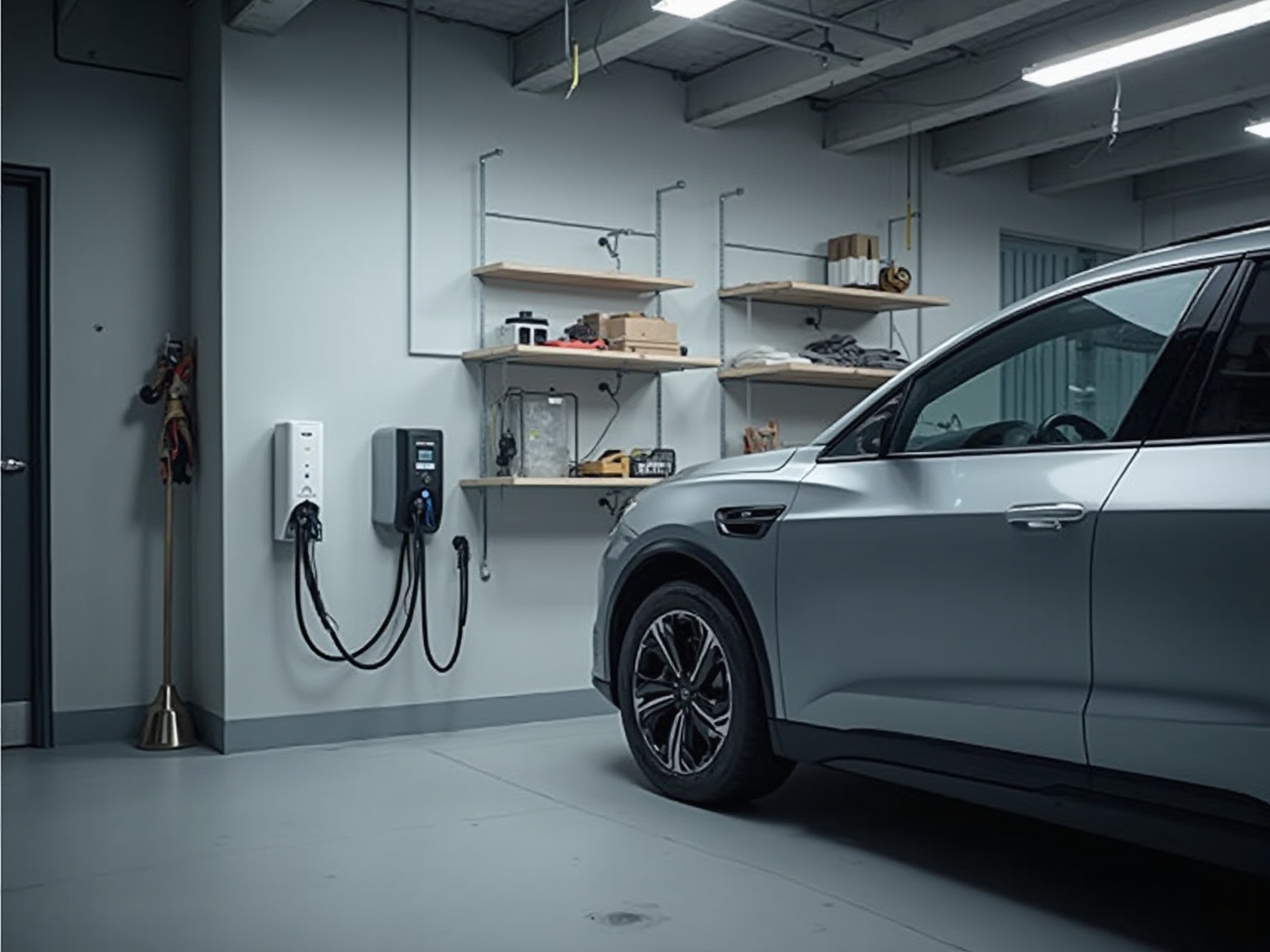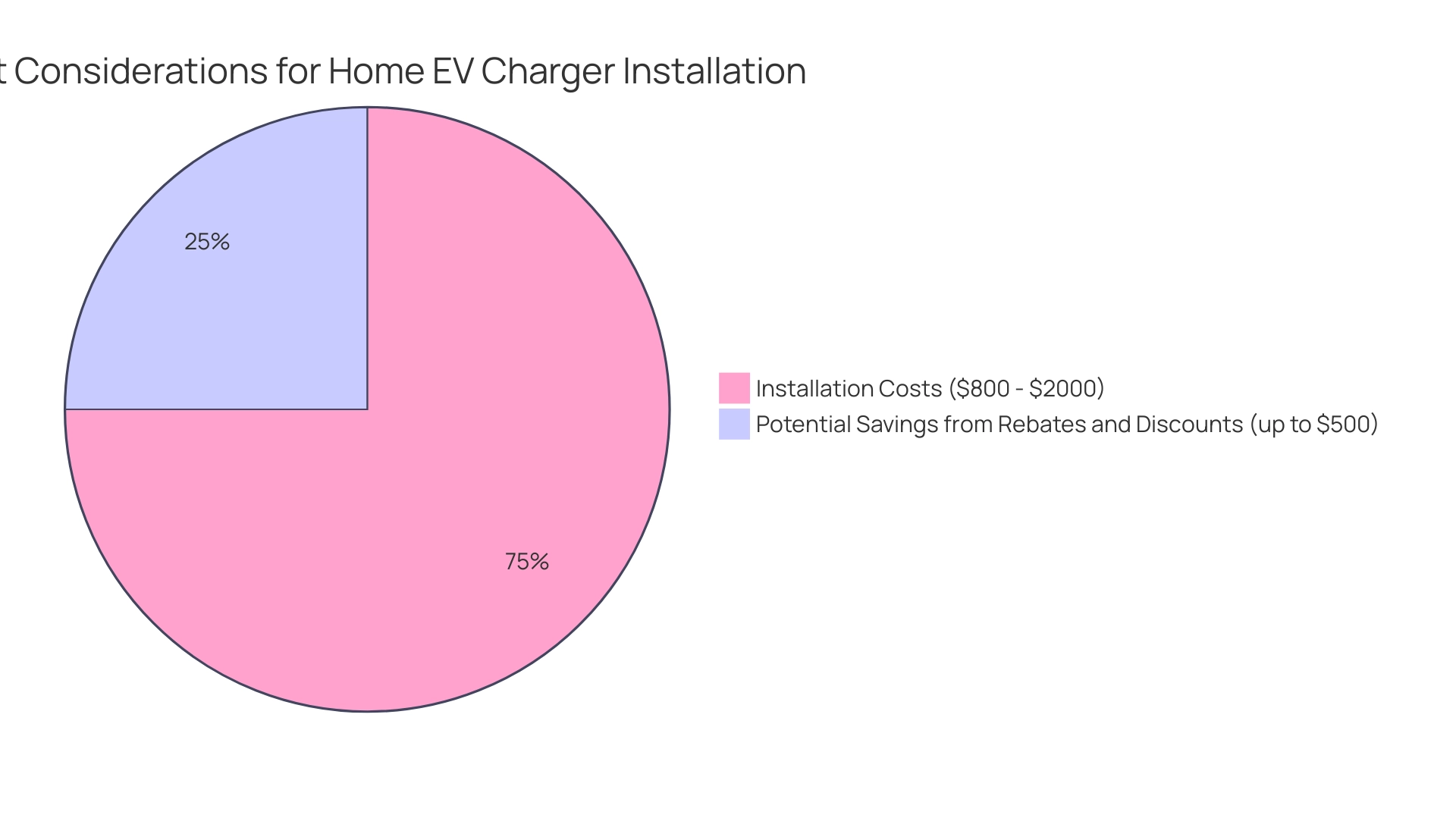Overview
The article provides a comprehensive guide on the necessary steps and considerations for the home installation of electric vehicle (EV) chargers, emphasizing the importance of planning, understanding charger types, and ensuring compliance with local regulations. It supports this by detailing key factors such as assessing driving habits, evaluating electrical capacity, exploring financial incentives, and highlighting the benefits of professional installation for safety and compliance.
Introduction
As the world shifts towards more sustainable energy solutions, homeowners are increasingly considering the installation of electric vehicle (EV) chargers in their garages. This transition not only supports a greener lifestyle but also brings about significant cost savings on fuel.
However, the process of planning and installing an EV charger can feel overwhelming, with numerous factors to consider—from understanding daily driving habits to navigating local regulations.
This article aims to guide homeowners through the essential steps of planning an EV charger installation, exploring the different types of chargers available, the costs involved, and the importance of professional installation.
With practical insights and helpful tips, readers will be well-equipped to embrace the electric vehicle revolution with confidence.
Essential Steps for Planning Your Home EV Charger Installation
To kick off your journey toward home installation electric vehicle charger, the first step is to assess your daily driving habits. Understanding how often and how far you drive will help you determine your charging needs more accurately. For instance, EV drivers spend only $1.22 to cover the same distance that a regular car would on a gallon of gasoline, highlighting the cost-effectiveness of owning .
Once you’ve got that down, think about the best spot for your charger—ideally, it should be right next to where you typically park your vehicle. Next, take a good look at your electrical panel to determine if it can support the additional load from a home installation electric vehicle charger. If not, don’t worry!
Planning for any necessary upgrades is just part of the process. It’s also a smart move to check in with your local utility company, as they often have specific requirements or recommendations for the home installation electric vehicle charger that can make your installation smoother. According to the Department of Energy, driving electric vehicles can, on average, cost about half as much as driving internal combustion engine vehicles, reinforcing the financial benefits of EV ownership.
Additionally, just as maintaining clean solar panels is essential for maximizing energy efficiency and extending their lifespan, ensuring your home’s electrical system is up to date is crucial for the longevity of your home installation electric vehicle charger. Regular cleaning of solar panels can prevent a loss of up to 25% of efficiency, emphasizing the financial advantages of maintenance. Innovative cleaning solutions, such as automated cleaning robots and self-cleaning coatings, can further enhance this efficiency.
To keep everything organized, create a checklist of these considerations. This way, you ensure that you cover all bases for a seamless planning experience. Moreover, data from the Department of Energy in the case study titled ‘Economic Benefits of Electric Vehicles’ illustrates that stable electricity costs compared to volatile gasoline prices make EVs a financially sensible choice, further encouraging their adoption.
If you’re seeking professional help, reach out to Powercore Electric to discover our extensive services for home installation electric vehicle charger, as well as other electrical requirements, including solar panel upkeep and battery backups. We’re here to help you every step of the way!
Understanding Different Types of EV Chargers and Their Requirements
When it comes to using a home installation electric vehicle charger to power up your electric vehicle (EV), you’ll encounter three main types of charging devices:
- Level 1
- Level 2
- DC Fast options
Level 1 devices, which connect to a standard household outlet, are ideal for overnight power replenishment but tend to be slower—consider them as your reliable slow cooker. Conversely, Level 2 power sources are essential for home installation electric vehicle chargers, requiring a dedicated circuit and greatly accelerating the refueling process, making them the preferred choice for many homeowners seeking to power their vehicles during the day or overnight.
Lastly, DC Fast Chargers are the heavyweights of the power supply world, typically found in commercial settings where quick top-ups are essential due to their high power output.
Before choosing a charger, it’s crucial to assess your vehicle’s compatibility and consider the installation requirements for . Notably, 39% of Americans reside within a mile of a public EV refueling station, highlighting the accessibility of options for homeowners. According to the Pew Research Center, EV refueling stations can be found in two-thirds of all U.S. counties, covering 95% of the country’s population.
Additionally, understanding the concerns around ‘range anxiety‘ can be beneficial, as data shows that regular long-distance drivers exhibit a higher propensity for EV ownership. This context is essential for homeowners to ensure that their home installation electric vehicle charger aligns perfectly with their lifestyle and their EV’s needs.
For those looking to install a home installation electric vehicle charger, consider reaching out to Powercore Electric Inc. They offer comprehensive services, including high-efficiency solar panels that can reduce your overall energy costs and battery backups that ensure you have power when you need it most. These solutions not only support your EV charging needs but also promote energy independence and sustainability.
You can contact Ryan Serrano at (916) 699-8778 or via email at ryan.serrano@powercoreinc.net for assistance and to explore your options.
Cost Considerations and Incentives for Home EV Charger Installation
Setting up a home installation electric vehicle charger generally ranges from $800 to $2,000, influenced by factors such as required electrical enhancements, setup complexity, and specific situations like the need for a dedicated circuit or trenching for wiring. It’s essential to explore local and federal incentives, such as rebates or tax credits, which can significantly reduce your overall expenses. Many utility companies also provide discounts for , assisting you in adopting eco-friendly technology without straining your budget.
For instance, some homeowners may qualify for up to $500 in rebates, which can reduce the cost of setup considerably. As you prepare your setup, take the time to research these options early on. Understanding the average annual electricity consumption of an EV—around 3,840 kWh, translating to approximately $683.52 in electricity costs—will aid in estimating your total investment and making the process more manageable.
Remember, as the friendly specialists at Powercore Electric emphasize, their dedication is to make home installation electric vehicle charger setups straightforward, economical, and tailored to your requirements. This approach not only emphasizes affordability but also the potential savings available through various incentives, ensuring your transition to green energy is both smooth and economical. In comparison to competitors, Powercore Electric stands out by offering tailored solutions that cater specifically to your charging needs, ensuring you receive the best value for your investment.
Navigating Permits and Compliance for EV Charger Installation
Before proceeding with the setup of your electric vehicle (EV) power source, it’s crucial to reach out to your local building department to comprehend the required permits. Each area has its own requirements, so checking early is key. Most locations will require some form of electrical permit, which your electrician can typically handle, ensuring your installation complies with local codes for a smoother process.
Plus, keeping a good record of all permits and inspections can be a valuable asset for future reference and might even boost your home’s resale value. As René Bennett, an informed staff writer, points out,
You can plug your electric car into a regular 120-volt household outlet only if you’re using a Level 1 device.
However, this method is considerably slower and may take several days to fully charge your vehicle.
For those aiming to enhance efficiency, comprehending compliance requirements and managing potential issues with permits can guide you on the right path to enjoying your new EV installation hassle-free. Additionally, considering the long-term cost savings from electric vehicle stations, such as lower operational and maintenance expenses compared to traditional fueling, can help you make a wise investment. In fact, a case study on utilizing regular outlets for electric vehicle power supply notes that for quicker recharging, a Level 2 device is recommended, which requires a 220- or 240-volt outlet.
Powercore Electric offers comprehensive electrical installation services, including:
- Estimates
- Troubleshooting
- Safety inspections
- Circuit installations
Ensuring a seamless setup for . Finally, if you’re also contemplating solar energy options, remember that selecting the right solar battery can further enhance your home’s energy efficiency and sustainability.
The Importance of Professional Installation for Your EV Charger
When it comes to installing your EV station, hiring a licensed electrician from Powercore Electric is not just a recommendation; it’s essential for ensuring a safe and compliant setup. Our friendly, local experts will thoroughly assess your home’s electrical system to confirm it can handle the additional load of a home installation electric vehicle charger, which is crucial for preventing potential hazards. With our deep understanding of local codes and regulations, we make the complex process accessible for homeowners like you.
In light of National Electrical Safety Month and Fire Prevention Week, the importance of safety in electrical setups cannot be overstated. While the upfront cost of professional setup might seem like an extra expense, it often results in better long-term outcomes and invaluable peace of mind. As Omar Vargas, head of public policy at General Motors, observes, ‘We’re assisting that type of planning, and we’re quite confident that in the next few years, we’re going to have a robust EV infrastructure in the United States.’
This commitment to infrastructure, along with General Motors’ substantial investment of $750 million in creating EV charging stations, highlights the essential role of professional setup as part of a broader effort toward . Keep in mind, while just 5% of home installation electric vehicle chargers are presently set up by handymen, choosing a licensed electrician from Powercore Electric can greatly lower safety incidents associated with DIY setups, ultimately promoting a safer atmosphere for you and your family. Moreover, our commitment to unparalleled quality craftsmanship and sustainable energy solutions guarantees that your EV charging setup is managed with the highest level of care and expertise.
We also offer services such as installing new circuits and house surge protectors, which are essential for enhancing your home’s electrical capacity and safety. Our dedication to sustainability ensures you can rely on that your setup will not only meet your needs but also contribute to a greener future. Don’t forget to ask about our free electrical estimates to help you budget for your EV charger installation.
Conclusion
Planning and installing an electric vehicle (EV) charger at home is a significant step toward embracing a more sustainable lifestyle while enjoying substantial savings on fuel costs. By assessing daily driving habits, homeowners can determine the right type of charger for their needs, whether it’s the slower Level 1 or the faster Level 2 option. Understanding the associated costs and available incentives can further ease the financial burden, making the switch to electric vehicles more accessible.
Navigating local regulations and securing the necessary permits is crucial for a smooth installation process. Engaging a professional electrician ensures compliance with safety standards and local codes, safeguarding both the installation and the home. The expertise of licensed professionals not only simplifies the process but also enhances peace of mind, knowing the installation is performed correctly and safely.
Overall, the transition to electric vehicle ownership is not just about convenience; it’s an investment in a greener future. By following these essential steps and seeking professional assistance, homeowners can confidently embark on their journey toward sustainable energy solutions, contributing to a cleaner environment while reaping the economic benefits of electric vehicle ownership.



